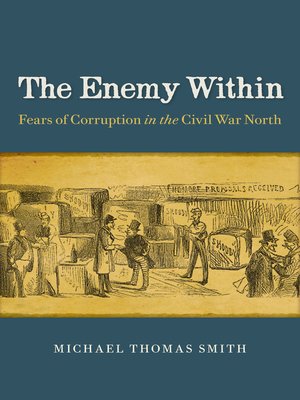The Enemy Within
ebook ∣ Fears of Corruption in the Civil War North · A Nation Divided
By Michael Thomas Smith

Sign up to save your library
With an OverDrive account, you can save your favorite libraries for at-a-glance information about availability. Find out more about OverDrive accounts.
Find this title in Libby, the library reading app by OverDrive.



Search for a digital library with this title
Title found at these libraries:
| Library Name | Distance |
|---|---|
| Loading... |
Stoked by a series of major scandals, popular fears of corruption in the Civil War North provide a unique window into Northern culture in the Civil War era. In The Enemy Within, Michael Thomas Smith relates these scandals—including those involving John C. Frémont's administration in Missouri, Benjamin F. Butler's in Louisiana, bounty jumping and recruitment fraud, controversial wartime innovations in the Treasury Department, government contracting, and the cotton trade—to deeper anxieties.
The massive growth of the national government during the Civil War and lack of effective regulation made corruption all but inevitable, as indeed it has been in all the nation's wars and in every period of the nation's history. Civil War Northerners responded with unique intensity to these threats, however. If anything, the actual scale of nineteenth-century public corruption and the party campaign fundraising with which it tended to intertwine was tiny compared with that of later eras, following the growth and consolidation of big business and corporations. Nevertheless, Civil War Northerners responded with far greater vigor than their descendants would muster against larger and more insidious threats.
In the 1860s the popular conception of corruption could still encompass such social trends as extravagant spending or the enjoyment of luxury goods. Even more telling are the ways in which citizens' definitions of corruption manifested their specific fears: of government spending and centralization; of immigrants and the urban poor; of aristocratic ambition and pretension; and, most fundamentally, of modernization itself. Rational concerns about government honesty and efficiency had a way of spiraling into irrational suspicions of corrupt cabals and conspiracies. Those shadowy fears by contrast starkly illuminate Northerners' most cherished beliefs and values.







